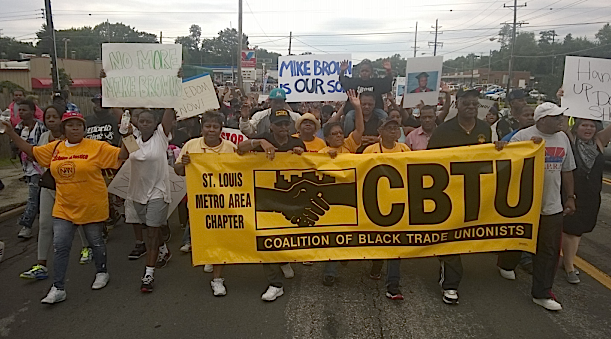
By Carla Murphy
Colorlines via Portside Labor
Oct 2, 2014 – Back in 1999, Victor Narro co-organized* up to 100 Los Angeles-based day laborers—mainly Latino and many undocumented—to attend the AFL-CIO convention, the nation’s largest labor gathering. Now, he admits, they were all a little naïve. Without affiliate status, the group learned at the entrance that they could not share the hall with the representatives of 12 million union workers. “We felt like, ‘Why would [certain] workers not be allowed into the AFL-CIO convention?’,” Narro says.
What Narro, who is now a project director at the UCLA Labor Center, recalls more vividly though, is the unofficial greeting: A grip of ironworkers and others in the construction trade formed and, “basically told us we had no business being there. We’re not a union. We take away union jobs.” Echoing a sentiment shared by many working people of color today, Narro says, “We felt that we were not part of the labor movement.” The last decade has given Narro hope however that an unprecedented all-workers movement, not just a union member-only movement, could one day become a reality.
There are signs that traditional labor leadership, if not its dwindling white male rank and file, is taking steps to better include workers of color. Not only has it recognized the growing strength of alt-labor [1] models like those built over the last 15 years by veteran organizer Narro. It’s slowly beginning to address the racial justice concerns of workers of color, too.
The latest indicator, labor observers say, was provoked by Michael Brown’s killing in Ferguson. It came three weeks ago in the form of a little-publicized but powerful speech [2] by AFL-CIO president Richard Trumka. During his remarks Trumka—a former mine worker from western Pennsylvania—urged the mostly white audience attending their St. Louis convention to honestly tackle racism. “We cannot wash our hands of these issues,” he said, before recounting how local labor had instigated a 1917 pogrom against African-American migrants in St. Louis. “Racism is part of our inheritance as Americans. Every city, every state and every region of this country has its own deep history with racism. And so does the labor movement.”
After watching Trumka’s speech on YouTube (his second on race [3]), Atlanta-based organizer Tamieka Atkins says she is more inclined to count herself as part of the labor movement. “I generally say that I belong to the domestic workers movement—or the workers rights movement because I haven’t felt represented by labor,” says Atkins, director of the first and largely African-American chapter [4] of the Latina and immigrant National Domestic Workers Alliance. As a sign of their growing strength, the 10,000-member alliance boasts a newly announced MacArthur “genius” grant winner in Ai-Jen Poo and domestic workers’ bills of rights wins in four states.
Continue reading Organized Labor Takes on Race and Michael Brown’s Cause
